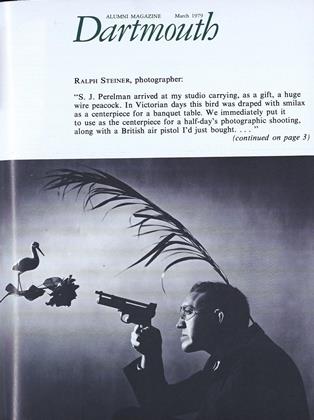The notice in The Dartmouth was discreet enough in wording, but rather hard to ignore. There it was, in black and white, with the rabbit and the bow-tie, a quarter-page ad that opened: "Playboy is scanning the Ivy League for a cross section of women for the upcoming September 1979 issue."
Hitting town along with the ad, photographer David Chan - the one doing the scanning - began interviewing at his Hanover Inn suite any Dartmouth woman who might want to model for anywhere from $100 to $400, depending on the amount of clothes, or lack thereof. Those less than thrilled at having Playboy scan anybody for any reason wasted no time in launching a brief, but intense, protest. And by the end of the week, between the newspaper coverage, radio interview, and fraternity invitations on the friendly side, and the barrage of angry letters and posters on the hostile side, Chan's mere presence had created more publicity for him than his own ad ever could have.
The Women-at-Dartmouth organization generated the most visible protests, setting up an information table in Hopkins Center and encouraging students to fill up Chan's schedule by calling in for phony appointments. "Basically," explained Emily Wheeler '80, "the point was to serve as a catalyst for discussion. We wanted to make women aware of the implications of modeling for Playboy, not only as it reflects on Dartmouth but also in the perpetuation of sexist attitudes in society." "Sexist" was just one of a stream of adjectives WAD leveled at Chan's project; others included "demeaning," "embarrassing," and "pornographic."
WAD also attacked The Dartmouth for running the ad in the first place, accusing the management of not assuming proper responsibility, and pointing out that the Harvard Crimson had earlier refused to accept a similar notice. Dartmouth publisher Mark Levine '80 defended his decision "on the grounds that we don't have the right to censor ads for our readership, unless they're misleading or in poor taste. The students here are mature enough to evaluate commercial enterprises of that nature by themselves." And as Chan himself pointed out, the Crimson ban ("small-minded," he called it) provoked a sympathetic backlash in favor of freedom to advertise.
No one seems to know exactly how many women Chan spoke with while here, but estimates run to at least several dozen. Out of these, only a handful at most will be chosen for actual shooting when Chan returns in the spring. And though by then the winter should have thawed, his reception could be even icier than in January.
 View Full Issue
View Full Issue
More From This Issue
-
 Feature
FeatureNine to Midnight (or two if hot)
March 1979 By Shelby Grantham -
 Feature
FeatureSTEINER: by himself
March 1979 -
 Books
BooksNotes on lost causes and an enlistment against Nature, as brave as it was brief.
March 1979 By R. H. R. -
 Article
ArticleWinter Carnival Blues
March 1979 By Biĺ Conway '79 -
 Article
ArticleLiberal Learner
March 1979 By M.B.R. -
 Class Notes
Class Notes1974
March 1979 By STEPHEN D. SEVERSON
Article
-
 Article
ArticleHEATING AND LIGHTING THE COLLEGE BUILDINGS
March 1912 -
 Article
ArticleCharles G. DuBois '91 Nominated as Alumni Trustee
DECEMBER 1927 -
 Article
ArticleAL MARSTERS
AUGUST 1929 -
 Article
ArticleLYMAN C. WHITTAKER '42,
MARCH 1966 -
 Article
ArticleEmployment
SEPTEMBER 1988 -
 Article
ArticleLearning how the system works – or doesn't work
MAY 1978 By A.B.

